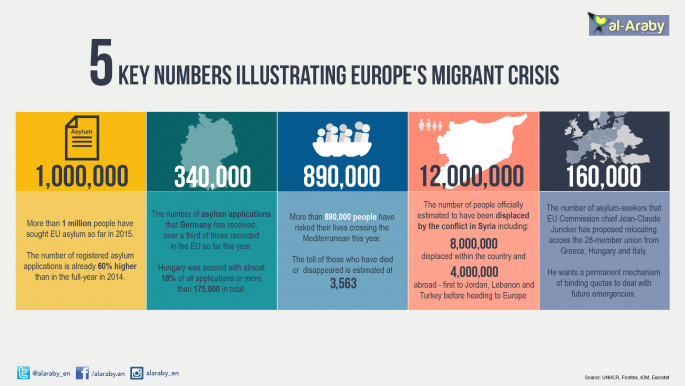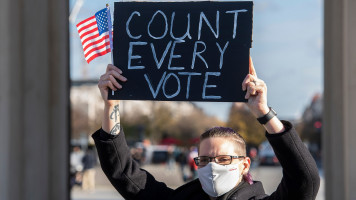World's leading economies pledge $1.8 billion to Syrian refugees
The G7 group of leading economies, European countries and Gulf states pledged $1.8 billion in funding Tuesday for UN aid agencies struggling with the worst refugee crisis in 70 years.
The commitment, which in part reflects earlier pledges, came after UN Secretary-General Ban Ki-moon told world leaders at the opening of the General Assembly debate that UN humanitarian agencies were "broke".
"We have agreed to provide together $1.8 billion for the international aid organizations of the United Nations, especially the UN refugee agency and the World Food Program," German Foreign Minister Frank-Walter Steinmeier told reporters.
The pledge was announced after a meeting of foreign ministers of the G7 - Britain, Canada, France, Germany, Italy, Japan and the United States - with their counterparts from Austria, the Netherlands, Norway, Sweden, Switzerland, Turkey, Kuwait, Qatar, Saudi Arabia and the United Arab Emirates.
Separately at the United Nations, Japan's Prime Minister Shinzo Abe announced a $1.5 billion commitment by Japan to help counter the growing Middle East refugee crisis.
It would include $810 million to assist refugees from and within Syria and Iraq - triple the amount Japan provided last year - and $750 million for peace building in the Middle East and Africa.
The United Nations is struggling to help some 60 million people displaced by conflict, the highest number since the end of World War II.
Four million have fled the war in Syria, with hundreds of thousands traveling to Europe to try to rebuild their lives.
Broke
UN High Commissioner for Refugees Antonio Guterres thanked Germany and donor countries for stepping up with financial contributions.
"We were financially broke," he said, adding that UN agencies were unable to provide the "bare minimum" for refugees in countries neighboring Syria.
"This was one of the reasons why we were witnessing more and more refugees moving onwards because it was impossible to sustain their lives in their first countries of asylum," Guterres added.
The UNHCR chief noted that "the generosity of the international community has not diminished" over the past few years, with donations actually on the rise.
"But unfortunately, the needs have increased in a much more dramatic way," he said.
The United Nations is asking for a record $20 billion to meet this year's needs - six times the level of a decade ago.
UN appeals for Iraq, South Sudan and Yemen have received about half of the funds needed and only a third of the money requested for Syria.
Steinmeier said international aid organizations are "dramatically underfunded" and are now "calling for aid themselves".
Germany committed 100 million euros ($113 million) to UN agencies as part of the $1.8 billion.
The individual breakdown of the sum was not immediately clear but Western sources said that the pledge reflects at least in part earlier commitments by the European Union and others.
The foreign ministers of the G7 and the participating countries in a statement called "on all members of the international community to scale up their humanitarian assistance".
They also demanded that "refugees and displaced persons must be treated with dignity" and urged world leaders to address the "root causes of displacement".
The war in Syria and Europe's migration crisis will take center stage at the United Nations on Wednesday, as world leaders seek to overcome deep divisions over how to address the turmoil.
Russia will chair a Security Council meeting on terrorist threats that is expected to focus on the crisis in Syria.
Ban will separately host a meeting on Europe's migration crisis aimed at agreeing on a global response.
The G7 group of leading economies, European countries and Gulf states pledged $1.8 billion in funding Tuesday for UN aid agencies struggling with the worst refugee crisis in 70 years.
The commitment, which in part reflects earlier pledges, came after UN Secretary-General Ban Ki-moon told world leaders at the opening of the General Assembly debate that UN humanitarian agencies were "broke."
"We have agreed to provide together $1.8 billion for the international aid organizations of the United Nations, especially the UN refugee agency and the World Food Program," German Foreign Minister Frank-Walter Steinmeier told reporters.
The pledge was announced after a meeting of foreign ministers of the G7 - Britain, Canada, France, Germany, Italy, Japan and the United States - with their counterparts from Austria, the Netherlands, Norway, Sweden, Switzerland, Turkey, Kuwait, Qatar, Saudi Arabia and the United Arab Emirates.
Separately at the United Nations, Japan's Prime Minister Shinzo Abe announced a $1.5 billion commitment by Japan to help counter the growing Middle East refugee crisis.
It would include $810 million to assist refugees from and within Syria and Iraq - triple the amount Japan provided last year - and $750 million for peace building in the Middle East and Africa.
 |
| [Click to enlarge] |
The United Nations is struggling to help some 60 million people displaced by conflict, the highest number since the end of World War II.
Four million have fled the war in Syria, with hundreds of thousands traveling to Europe to try to rebuild their lives.
Broke
UN High Commissioner for Refugees Antonio Guterres thanked Germany and donor countries for stepping up with financial contributions.
"We were financially broke," he said, adding that UN agencies were unable to provide the "bare minimum" for refugees in countries neighboring Syria.
"This was one of the reasons why we were witnessing more and more refugees moving onwards because it was impossible to sustain their lives in their first countries of asylum," Guterres added.
The UNHCR chief noted that "the generosity of the international community has not diminished" over the past few years, with donations actually on the rise.
"But unfortunately, the needs have increased in a much more dramatic way," he said.
The United Nations is asking for a record $20 billion to meet this year's needs - six times the level of a decade ago.
UN appeals for Iraq, South Sudan and Yemen have received about half of the funds needed and only a third of the money requested for Syria.
Steinmeier said international aid organizations are "dramatically underfunded" and are now "calling for aid themselves".
Germany committed 100 million euros ($113 million) to UN agencies as part of the $1.8 billion.
The individual breakdown of the sum was not immediately clear but Western sources said that the pledge reflects at least in part earlier commitments by the European Union and others.
The foreign ministers of the G7 and the participating countries in a statement called "on all members of the international community to scale up their humanitarian assistance."
They also demanded that "refugees and displaced persons must be treated with dignity" and urged world leaders to address the "root causes of displacement".
The war in Syria and Europe's migration crisis will take center stage at the United Nations on Wednesday, as world leaders seek to overcome deep divisions over how to address the turmoil.
Russia will chair a Security Council meeting on terrorist threats that is expected to focus on the crisis in Syria.
Ban will separately host a meeting on Europe's migration crisis aimed at agreeing on a global response.





 Follow the Middle East's top stories in English at The New Arab on Google News
Follow the Middle East's top stories in English at The New Arab on Google News


![Algeciras port [Getty]](/sites/default/files/styles/image_330x185/public/75377010.jpeg?h=327453ef&itok=KfCFUEza)